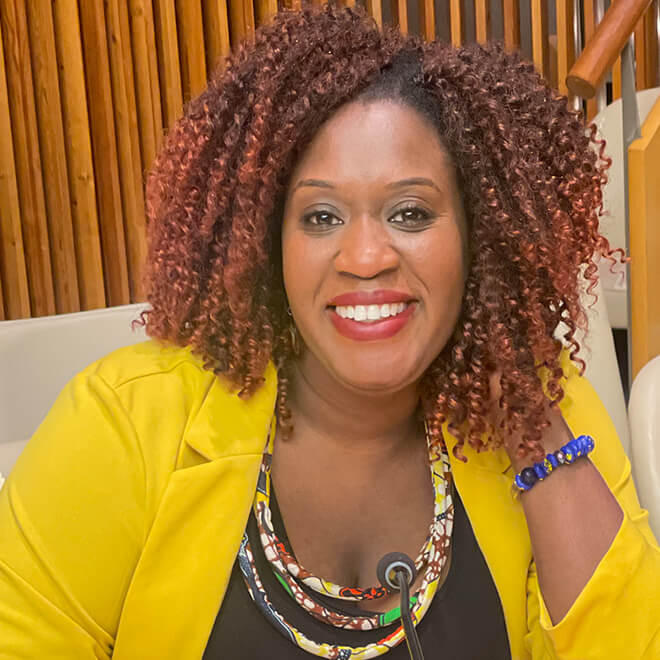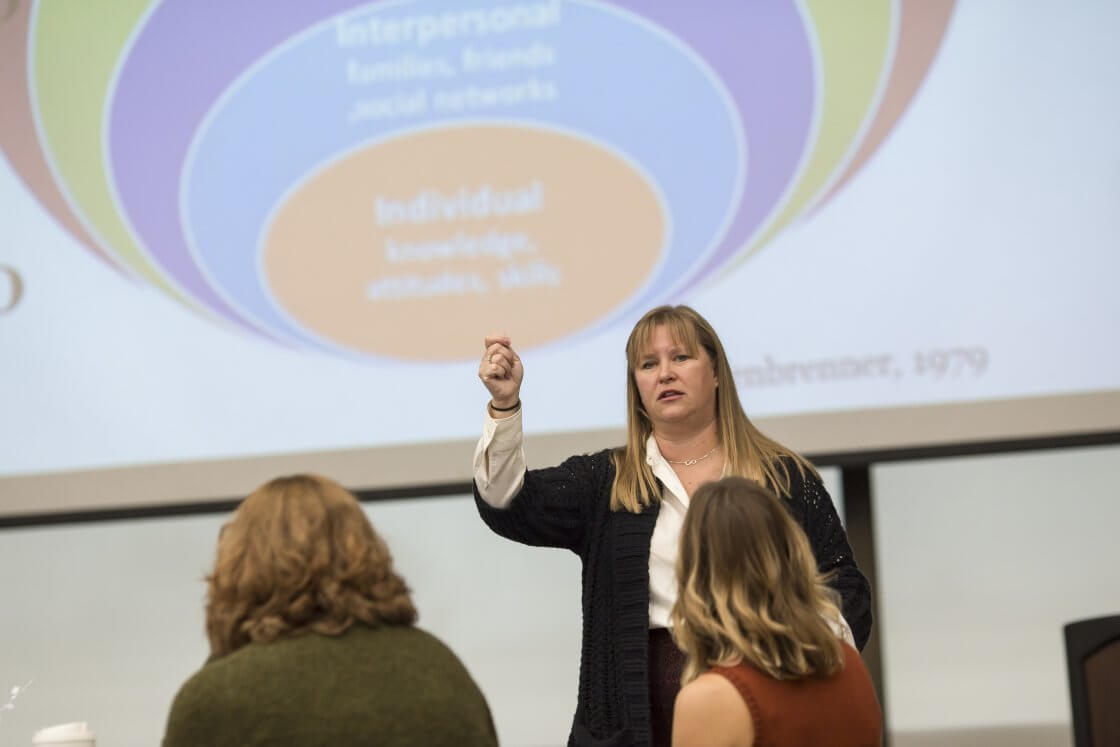
Michelle Scott, Ph.D., M.S.W
- Professor
Department: School of Social Work
Office: Robert E. McAllan Hall 311
Phone: 732-263-5428
Email: mscott@monmouth.edu
Michelle Scott, M.S.W., Ph.D., currently, is an Associate Professor in the School of Social Work and Director of the SRF Suicide Prevention Research and Training Project. The project began in January 2017 after a large private donation. The SRF project is a natural development for Dr. Scott as she was the recipient of a Substance Abuse Mental Health Service Administration, Garrett Lee Smith Suicide Prevention on Campus grant entitled Promoting Wellness and Resiliency on Campus Initiative at Monmouth University, from 2012-2016.
Her research career has focused on suicide prevention of youth and young adults. Her work extends from evaluations of school-based screening for suicide-risk including evaluating the Columbia Suicide Screen, the original measure used in Columbia University: Teen Screen, and to evaluations of educational approaches and programs for suicide prevention. In 2008, after joining the faculty in Monmouth University’s School of Social Work, she has become involved in local and State suicide initiatives.
At the State level, Dr. Scott serves as the Chair for New Jersey’s Youth Suicide Prevention Advisory Council and is a member of the Child Fatality Review- Suicide Subcommittee. In addition, she has led evaluation efforts for both New York and Arkansas’ Garrett Lee Smith Suicide Prevention Initiative Programs and has been a participant in several national working groups on Upstream Suicide Prevention and Developmentally-appropriate Warning Signs for Suicide Prevention.
Beyond research, Dr. Scott has trained mental health professionals, faculty and student in suicide prevention, intervention and postvention strategies working with schools and communities across the United States.
Education
Ph.D., University of California, Berkeley
M.S.W., University of California, Berkeley
B.A., Clark University
Research Interests
Dr. Scott’s research career has focused on suicide prevention of youth, young adults, and, more recently, law enforcement. Her work extends from evaluations of school-based screening for suicide-risk (i.e. evaluating the Columbia Suicide Screen, the original measure used in Columbia University: Teen Screen), suicide prevention programs, integrating cognitive behavioral therapy into social work practice, and analysis of the impact of Netflix series 13 Reasons Why.
Books
Underwood M, Kalafat J, State of Maine, Society for the Prevention of Teen Suicide, Scott M , Springer J, Geddes J (in press). Lifelines: A Suicide Prevention Program (revision). Hazelden, Inc; MN. – ( to be submitted for Best Practice Registry review upon publication- expected Summer 2018 )
Underwood M, Scott M , Springer J, Society for the Prevention of Teen Suicide (2011). Lifelines Intervention: Helping Students At Risk for Suicide. Hazelden Publications: Center City, MN.( On Best Practice Registry)
Scholarly Articles
Scott M. (in press). Integration of Evidence-Based Interventions for Suicide Prevention In Social Work Practice. Journal of Research on Social Work Practice.
Scott M, Hogan C (under review). Faculty’s use of syllabi and course-related technology to support students’ emotional health and wellness. Journal of Teaching in Social Work.
Scott M, Feldman B, Underwood M(2016). Delivering Professional Development in Suicide Prevention: A Comparison of Online Versus In-Person Training. Pedagogy in Health Promotion. 2(4):266-275. PubDate: 2016-07-13T07:00:00Z. DOI: 10.1177/2373379916658667
Scott M (2015). TEACHING NOTE: Understanding Suicide Prevention, Intervention and Postvention: Curriculum for MSW students. Journal of Social Work Education. 51(1): 177-185. 9p. DOI: 10.1080/10437797.2015.979095.
Scott M., Underwood M, Lamis D (2015). Suicide and Related-Behavior Among Youth involved in the Juvenile Justice system. Child & Adolescent Social Work Journal. 32(6): 517-527. DOI: 10.1007/s10560-015-0390-8.
Miranda R, Ortin A, Scott M, Shaffer D (2014). Characteristics of suicidal ideation that predict the transition to future suicide attempts in adolescents. Journal of Child Psychology and Psychiatry. 55 (11): 1288-1296.
Underwood M, Scott M, Springer J (2011). The Facts about Bullying & Suicide Risk: Opportunities for Social Work Intervention. Social Work Today, 11(5); 10.
Scott M, Wilcox H, Fisher P, Turner JB, Huo Y, Shaffer D. (2010). School-Based Screening For Suicide Risk: Balancing Costs and Benefits. American Journal of Public Health. 100(9): 1648 – 1652.
Scott M, Wilcox H, Schonfeld IS, Davies M, Hicks RC, Turner JB, Shaffer D. (2009). The Columbia Suicide Screen: An Examination of Whether School-Based Screening Identifies At-Risk Students Not Already Known to School Professionals. American Journal of Public Health. 99(2): 334-339.
Miranda R, Scott M, Hicks R, Wilcox HC, Harris Munfakh JL, Shaffer D (2008). Suicide attempt characteristics, diagnoses, and future attempts: comparing multiple attempters to single attempters and ideators. J Am Acad Child Adolesc Psychiatry. 47(1):32-40.
Shaffer D, Scott M, Wilcox H, Maslow C, Hicks R, Lucas C, Garfinkel R, Greenwald S. (2004). The Columbia Suicide Screen: Validity and reliability of a screen for youth suicide and depression. J Am Acad Child Adolesc Psychiatry. 43(1):71-79.
Scott M, Parthasarathy S, Kohn C, Hinman A, Sterling S, Weisner C. (2004). Adolescents with substance diagnoses in an HMO: Factors associated with medical provider referrals to substance abuse and mental health treatment. Ment Health Serv Res. 6(1):47-60.
Scott MA, Snowden L, Libby AM. (2002). Effects of capitated mental health services on youth contact with the juvenile justice system. J Am Acad Child Adolesc Psychiatry. 41(12):1462-1469.
Scott MA, Snowden L., Libby AM. (2002). From mental health to juvenile justice: What factors predict this transition? Journal of Child & Family Studies. 11(3), 299-311.
Scott MA, Snowden L, Libby AM. (2002). Alcohol and juvenile justice contacts: A comparison of fee-for-service and capitated Medicaid mental health services. J Stud Alcohol. 63(1):44-48.
Pine D, Scott M, Busner C, Davies M, Fried JA, Parides M, Shaffer D (1996). Psychometrics of neurological soft signs. J Am Acad Child Adolesc Psychiatry. 35(4):509-515.
Pine D, Rish M, Shaffer D, Busner C, Davies M, Fried J, Charney E (1994) Psychometrics of soft signs. Abstract. J Am Acad Child Adolesc Psychiatry. (6):918.
Popular Articles
Underwood M, Scott M , Springer J (2011). The Facts about Bullying & Suicide Risk: Opportunities for Social Work Intervention. Social Work Today 11(5): 10-15.
Presentations/Invited Talks
Scott M, Underwood M (April, 2017). Perceived effectiveness of Suicide Postvention Crisis Training: Return to functioning while preparing for the future. American Association for Suicidology Annual Conference, Phoenix , Arizona.
Scott M, Underwood M (April, 2015). 21st Century Outreach: How to Connect with College Students. American Association for Suicidology Annual Conference, Atlanta, Georgia.
Ortin A, Miranda R, Scott M , Shaffer D (June, 2013). Characteristics of suicidal ideation associated with the transition to suicide attempts in adolescence. International Association of Suicide Research: World Congress on Suicide, Montreal, Canada.
Scott M , Feldman B (March, 2013). Online versus face-to-face trainings: Is human contact needed when teaching sensitive material? 2013 Annual Baccalaureate Program Directors Conference, Myrtle Beach, South Carolina.
Scott, M (Sept, 2012). Transportability of CBT for Depression and Suicide Prevention to Practice: the Role of Consultation. 14th Annual European Symposium on Suicide and Suicidal Behavior, Tel Aviv, Israel. Paper presentation.
Scott, M (Sept, 2012). The effect of suicide crisis team training: Experiences of a high school experiencing a suicide cluster. 14th Annual European Symposium on Suicide and Suicidal Behavior, Tel Aviv, Israel. Paper presentation.
Forthcoming
National evaluation of Netflix series “13 Reasons Why” from the perspective of school counselors and school social workers
Professional Associations
2019 – present: Founding Member, Youth Suicide Research Consortium, https://www.youthsuicideresearch.org/mission
2017 – present: Director, SRF Suicide Prevention Research and Training Project, School of Social Work, Monmouth University, West Long Branch, New Jersey.
2016 – present: Chair (October 1, 2017 –August 31, 2020) and member (Sept, 2016-Sept 30, 2017, Sept 1, 2020 – present), Institutional Review Board, Monmouth University, West Long Branch, New Jersey.
2016 – present: Member, New Jersey Child Fatality Review Board- Suicide Division.
2014 – present: Associate Professor, School of Social Work, Monmouth University, West Long Branch, New Jersey.
2010 – present: Member (2010- present) and Chair (2011- October, 2018), New Jersey Youth Suicide Prevention Advisory Council to the Governor, Department of Children and Families, New Jersey, Appointed by State Senate of New Jersey
2009 – 2016: Executive Board Member, Society for the Prevention of Teen Suicide (SPTS), Freehold, New Jersey
Trainer, Lifelines Prevention, Intervention, Postvention
Trainer, Columbia Suicide Severity Rating Scale
Trainer, Safety Planning Intervention
Trainer, Campus Connect
Trainer, Making Education Partners in Suicide Prevention
Awards
2014 – Runner-up, Martin Luther King Award, Monmouth University, West Long Branch, New Jersey
2014 – Nominated, Distinguished Teacher Award, Monmouth University, West Long Branch, New Jersey
2016 – Nominated, Richard Lodge Prize, School of Social Work, Adelphi University
2016 – Best Teaching Note: Honorable Mention, Journal of Social Work Education-vo51
2018 – Nominated, 2017-18 NAGS Master’s-level Teaching Award.
Additional Information
Member, School Personnel Committee, School of Social Work, Monmouth University
Member, Advisory Board, Center for Excellence in Teaching and Learning, Monmouth University
Chair, New Jersey Youth Suicide Prevention Advisory Council to the Governor, State of New Jersey
Member, Suicide Sub-committee, Child Fatality Review Board, State of New Jersey
Grant Support (or Funding)
2002 – 2004 American Suicide Foundation Grant, Perceived Need and Service Utilization by Youth At-Risk for Suicide. Grant Award: $15,000 – principal investigator
2010 – 2012 Monmouth County Freeholders, Training of Counselors in Cognitive Behavioral Therapy for Depression for Adolescents, Grant Award, $25,000 – consultant
2010– 2011 Grant in Aid of Creativity- Monmouth University, Evaluation of Crisis Team Training for Suicide Prevention, Grant Award, $2,000 – principal investigator
2010- 2013 Office of Juvenile Justice and Delinquency Prevention, Juvenile Justice and Delinquency Prevention (JJDP) Act Funds, Title II; Disproportionate Minority Contact (DMC)
Reduction Program of Monmouth County, Grant Award: $180,000 – project evaluator
2011- 2014 Substance Abuse Mental Health Service Administration, New York State Garrett Lee Smith – Youth Suicide Prevention Grant, Grant Award – 1.4 million dollars – project evaluator
2012 – 2016 Substance Abuse Mental Health Service Administration, Garrett Lee Smith – Campus
Suicide Prevention Grant, Monmouth University- Promoting Wellness and Resiliency on Campus, Grant Award – $302,000 – Principal Investigator/ Project Evaluator
2014 – 2016 Substance Abuse Mental Health Service Administration, Arkansas Garrett Lee Smith – Youth Suicide Prevention Grant, Grant Award – 3.6 million dollars – project evaluator
2015-2016 Full-year sabbatical, Monmouth University
2017-2018 Grant in Aid of Creativity- Monmouth University, Evaluation of Lifelines Suicide Prevention, Intervention and Postvention training in schools, Grant Award, $2,000 – principal investigator
2018 Summer Faculty Fellowship, Monmouth University, Evaluation of 13 Reasons Why data.
2018 – 2021 Substance Abuse Mental Health Service Administration, Garrett Lee Smith – Campus Suicide Prevention Grant, Monmouth University- Connect to Wellness at Monmouth University – A Competent Community Initiative Grant Award – $305,735 – Principal Investigator/ Project Evaluator



